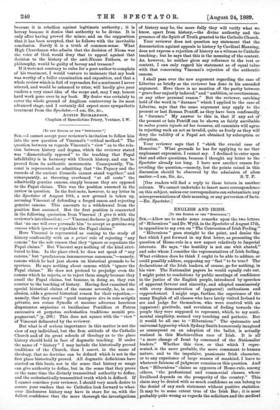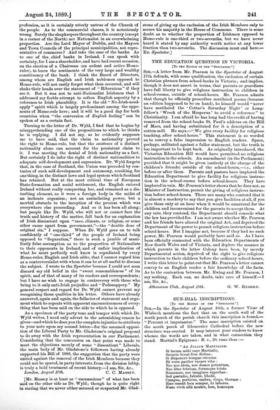ENGLISH AND IRISH.
[To THE EDITOR OF THE " SPECTATOR:1
Sin,—Allow me to make some remarks upon the two letters of " Hibernicus " and Dr. Wyld, in the Spectator of August 17th, in opposition to my own on " The Conversion of Irish Feeling.'
" Hibernicus " goes straight to the point, and denies the fact which I put forward in my first letter, as presenting the question of Home-rule in a new aspect relatively to Imperial interests. He says, " the hostility is not one whit abated,' and asks whom I consider the representatives of Irish feeling. What evidence does he think I ought to be able to adduce, or- could possibly adduce, supposing my " fact " to be true? The- declarations of the Irish leaders, of course, go for nothing, in his view. The Nationalist papers he would equally rale out. I might point to resolutions by public meetings of confidence- in the justice of the English people, introduced by speeches of apparent fervour and sincerity, and adopted unanimously with every demonstration of (apparent) enthusiasm and' rapprochement. I might urge, further, the experience of the- many English of all classes who have lately visited Ireland to see and judge for themselves, who were received with an (apparent) gratitude, and revulsion of feeling towards the people they were supposed to represent, which, to my senti- mental simplicity, seemed very touching and pathetic. But it would be all one to " Hibernicus." The systematic and universal hypocrisy which Sydney Smith humorously imagined as consequent on an adoption of the ballot, is actually realised in this Machiavellian race of Irish. It is all' "a mere change of front by command of the Nationalist leaders." Whether this view, or that which I repre- sented, is the more probable, the more consonant to human nature, and to the impulsive, passionate Irish character; or to any experience of large masses of mankind, I leave to whatever fairness of judgment remains on this question. And' then " Hibernicus " claims as opposers of Home-rule, among others, "the professional and commercial classes, whose livelihood depends on the prosperity of the country." This. claim may be denied with as much confidence as can belong to the denial of any such statement without positive statistics. It may be to some extent true of the Irish Bar; it is most probably quite wrong as regards the solicitors and the medical
profession, as it is certainly utterly untrue of the Church of the people. As to the commercial classes, it is notoriously wrong. Surely the shopkeepers throughout the country (except in a corner of the North) are Nationalist in an overwhelming proportion. Are the Lord Mayor of Dublin, and the Mayors and Town Councils of the principal municipalities, not repre- sentative of commerce P And take the case of the banks. As to one of the chief banks in Ireland, I can speak with certainty, for I am a shareholder, and have had recent occasion, on the election of a Chairman (an ardent and active Home- ruler), to learn the sentiments of the very large and wealthy constituency of the bank. I think the Board of Directors, among whom are English and Irish noblemen opposed to Home-rule, will not easily forget what then occurred, and will shake their heads over the statement of " Hibernicus" if they see it. But it was not to anti-Nationalist Irishmen that I addressed my feeble attempt to soften English asperity by a reference to Irish placability. It is the old " No-Irish-need-
apply " spirit which is largely predominant among the oppo- nents of Home-rule here ; and it will be a good day for both countries when "the conversion of English feeling" can be spoken of as a certain fact.
Turning to the letter of Dr. Wyld, I find that he begins by misapprehending one of the propositions to which he thinks he is replying. I did not say, as he evidently supposes
me to have said, that the claim to nationality proved the right to Home-rule, but that the existence of a distinct
nationality alone can account for the persistent claim to it. I was meeting the denial of Irish nationality as a fact. But certainly I do infer the right of distinct nationalities to adequate self-development and expression. Dr. Wyld forgets that, in the case of Scotland, the Union was preceded by cen- turies of such self-development and autonomy, resulting, for one thing, in the distinct laws and legal system which Scotland has retained. But at the most critical time of European State-formation and social settlement, the English entered Ireland without really conquering her, and remained as a dis- turbing element, as it were a foreign body in the midst of an inchoate organism; not an assimilating power, but a morbid obstacle to the inception of the process which was everywhere else proceeding. And so it has been all along; but people like Dr. Wyld, who will not or cannot face the truth and history of the matter, fall back for an explanation of Irish discontent upon "race, climate, or religion, or some other cause apart from government,"—the "double dose of original sin," I suppose. When Dr. Wyld goes on to talk confidently of " one-third" of the people of Ireland being opposed to " Separation," there is such a jumble of mani- festly false assumption as to the proportion of Nationalists to their opponents in Ireland, and of unfair implication of what he must perfectly well know is repudiated by every Home-ruler, English and Irish alike, that I cannot regard him as a controversialist with whom it can be at all useful to discuss
the subject. I wrote to the Spectator because I could not soon
discard my old belief in the " sweet reasonableness " of its spirit, and of that of many of its readers and correspondents ; but I have no wish to engage in controversy with those who bring to it only anti-Irish prejudice and " Podsnappery." My general respect and regard for Dr. Wyld cannot prevent my recognising those qualities in his letter. Others have already answered, again and again, the fallacies of statement and argu- ment which he repeats with apparent unconsciousness of every- thing that has been said on the side to which he is opposed.
As a specimen of the party tone and temper with which Dr. Wyld writes, I need only advert to the astonishing reason he gives—and which he does you the complete injustice to attribute to your note upon my second letter—for the assumed opposi- tion of the Liberal Party to Mr. Gladstone's original proposal to do away with the Irish representation in our Parliament.
Considering that the concession on that point was made to meet the objections merely of some " dissentient" Liberals, the main body of Mr. Gladstone's followers having already supported his Bill of 1886, the suggestion that the party were united against the removal of the Irish Members because they could not be spared, in party interests, from the division lobby, is truly a bold treatment of recent history.—I am, Sir, &c.,
[Mr. Massey is at least as " unconscious" of what has been said on the other side as Dr. Wyld ; though he is quite right in stating that we never either accused or suspected Mr. Glad-
stone of giving up the exclusion of the Irish Members only to secure his majority in the House of Commons. There is some doubt as to whether the proportion of Irishmen opposed to Home-rule is one-third or two-sevenths, but we have never heard it stated by any authority worth notice at any lower fraction than two-sevenths. The discussion must end here.— ED. Spectator.]



































 Previous page
Previous page